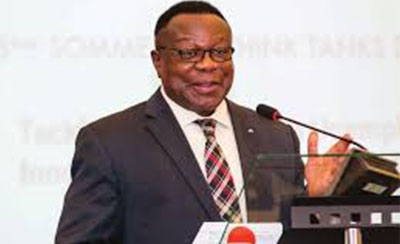
The Executive Secretary, Prof. Emmanuel NNADOZIE, briefed the Ministerial Specialized Technical Committee on Finance, Monetary Affairs, Economic Planning and Integration, on the outcome Report of the 7th Africa Think Tank Summit hosted by the African Capacity Building Foundation (ACBF) on 18 and 19 November 2020.
The two-day virtual Summit attended by over 120 participants from African States, Think Tanks, the Private Sector, Civil Society, and several development partners, ran with the theme “Implementing the African Continental Free Trade Area (AfCFTA) Agreement: Assessing country readiness and the implications for capacity-building.”
The Summit provided a platform for African Think Tanks and other key stakeholders to engage in a high-level deliberation on the most effective ways of addressing capacity challenges of Member States, in a bid to enhance country readiness, and accelerate implementation of the AfCFTA, particularly in light of the COVID-19 pandemic.
In his briefing, Prof. Nnadozie said the Summit had reiterated deep concern about the challenges facing the implementation of AfCFTA and the negative impact of the COVID-19 pandemic and emphasized the urgent need for capacity building to enhance country readiness to put the AfCFTA back on track. The Summit also underscored the harnessing and recognition of Think Tanks as the source of the policies for the domestication of the ACFTA, its implementation and monitoring and evaluation at the national, regional and continental levels.
“The Summit committed to providing advice on the policy options and innovative solutions available to successfully tackle the bottlenecks facing the implementation of the AfCFTA using knowledge, research and networking, while expanding outreach to policy actors and making research accessible to support the AfCFTA,” said the Executive Secretary.
The Summit report recommends African governments and key stakeholders, the private sector, to work with African Think Tanks and Capacity Building Institutions to support the expansion, retention and use of capacities required to develop home-grown interventions for the effective implementation of the AfCFTA.
It called for support to Think Tanks in conducting strategic studies on human, institutional and transformative leadership capacity gaps facing the continent and sharing of best practices on how to address gaps to facilitate the effective implementation of the AfCFTA.
Prof. Nnadozie said the Summit had strongly recommended that ACBF coordinates the development of capacity development interventions to address gaps in key areas identified as; mapping of AfCFTA interventions, awareness, commitment and operational readiness, human capital and skills development, digital capacity, institutional and policy support, knowledge-sharing and advocacy based on the Foundation’s capacity development strategy to accelerate the implementation of AfCFTA in Africa.
The Summit has also called for continued political and financial support to ACBF and other supporters of Think Tanks which is critical in ensuring that platforms such as the Africa Think Tank Summit are convened, and networks such as the Africa Think Tank Network are sustained. This support will ensure the sustainability and efficient provision of home-grown solutions to address structural issues in the implementation of AfCFTA.
“Honorable Ministers, ACBF has created and supported over 50 Think Tanks in Africa, that are providing evidence-based policy in your countries and in your Ministries and Central Banks. We enjoin you to support them and use their services. Many of you are already doing so and we commend you. Support us also, so that we can continue to support them,” Prof. Nnadozie submitted.
The Summit was supported by ACBF partner institutions, including the African Development Bank (AfDB), the African Export-Import Bank (Afreximbank), the African Union Commission (AUC), the Arab Bank for Economic Development in Africa (BADEA), the Development Centre for the Organization for Economic Co-operation (OECD-Dev), the International Cooperation Centre of China’s National Development and Reform Commission (ICC-NDRC), the International Institute for Democracy and Electoral Assistance (International IDEA), the Islamic Development Bank (IsDB), the Southern Voice, the United Nations Economic Commission for Africa (UNECA), and the United Nations Development Programme (UNDP).
For interview requests, contact:
Ms. Ntsiuoa SEKETE: Senior Communication Officer: Mobile No. +27 72 658 9295 Email: n.sekete@acbf-pact.org





